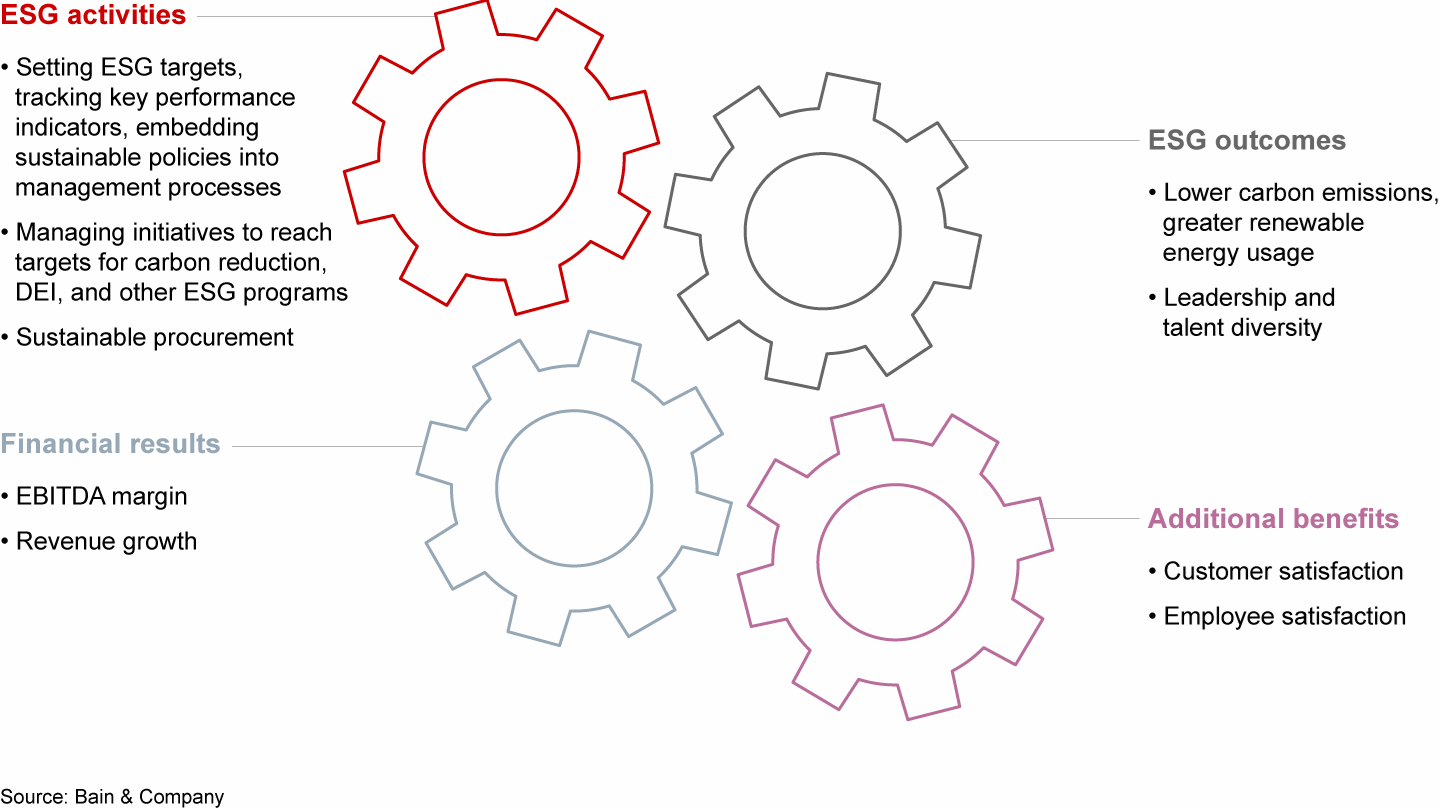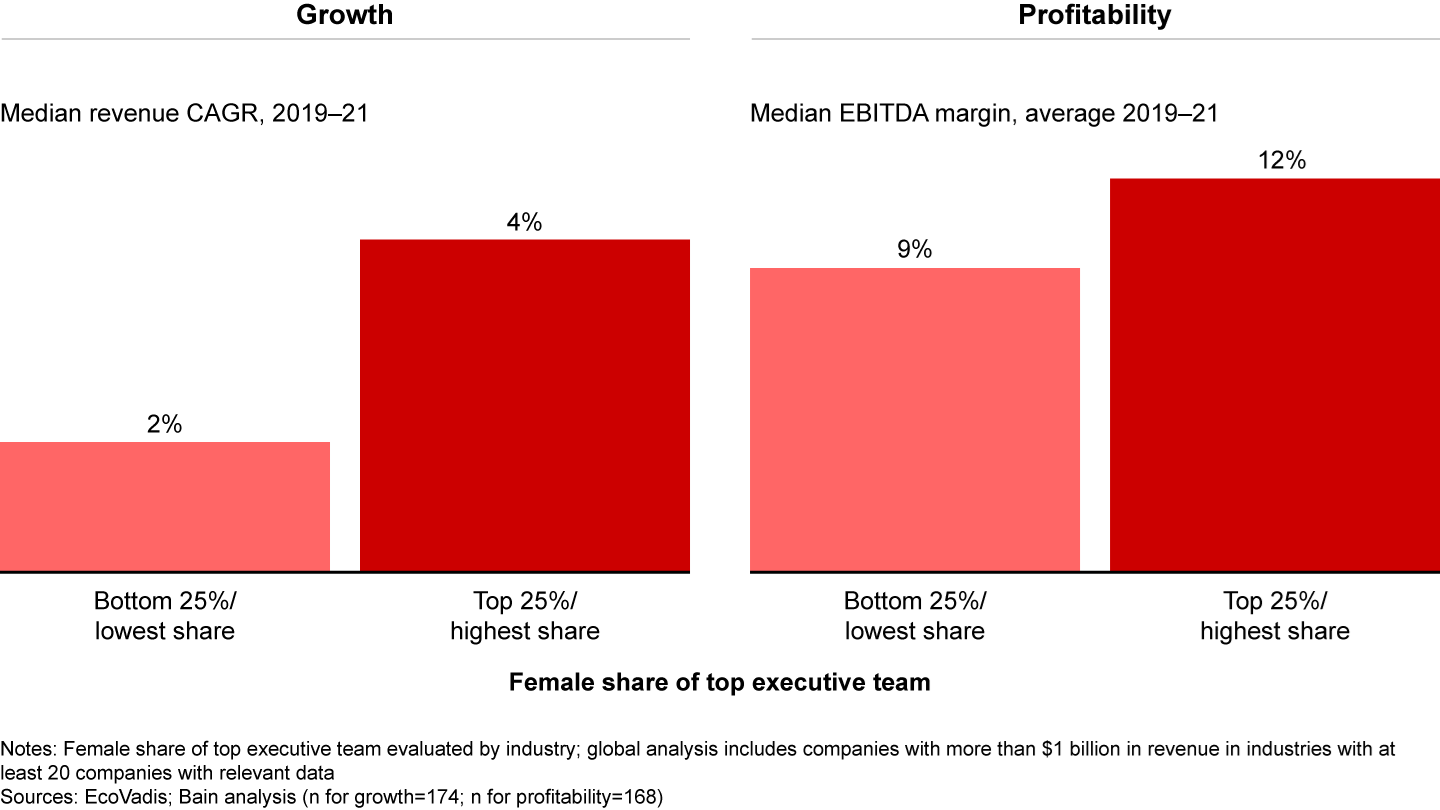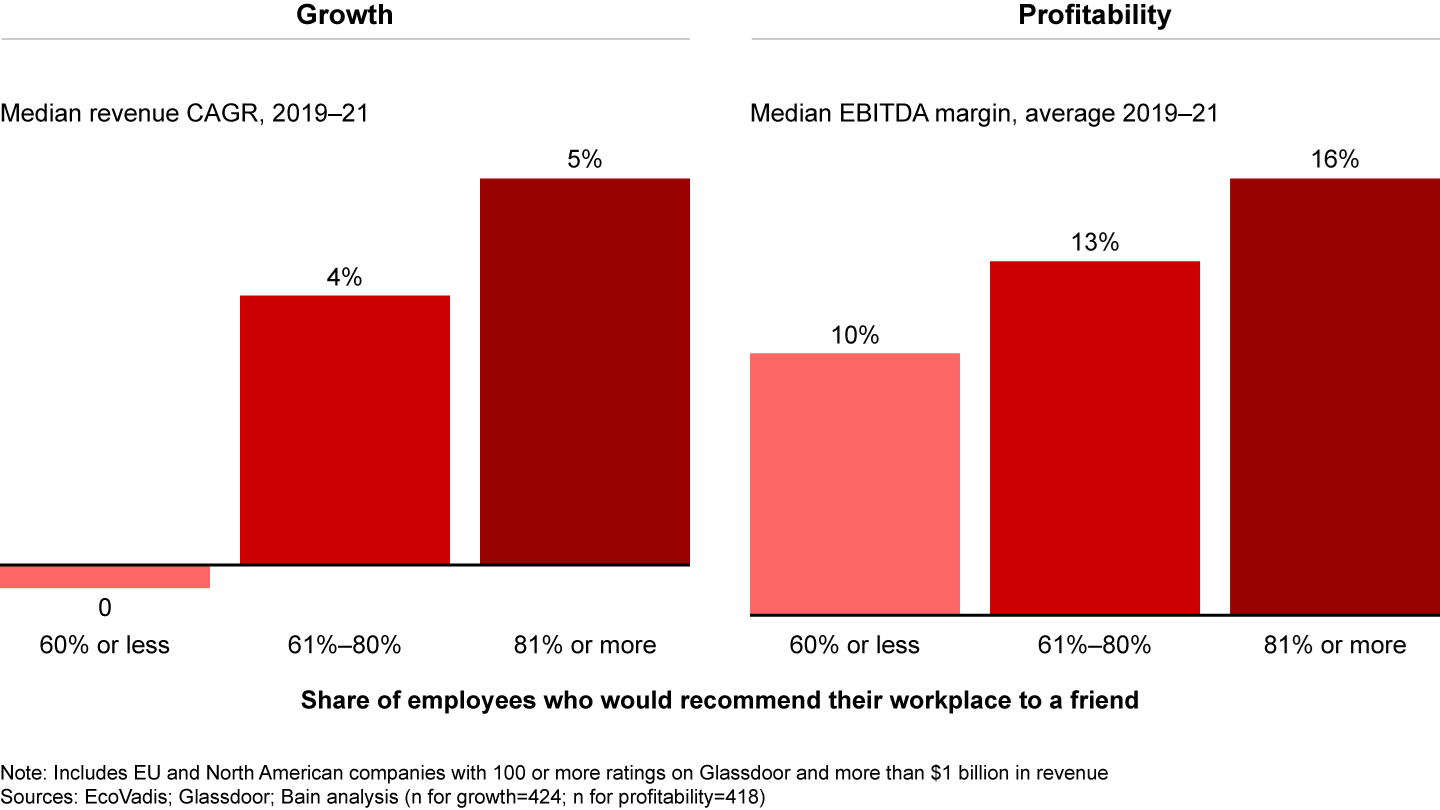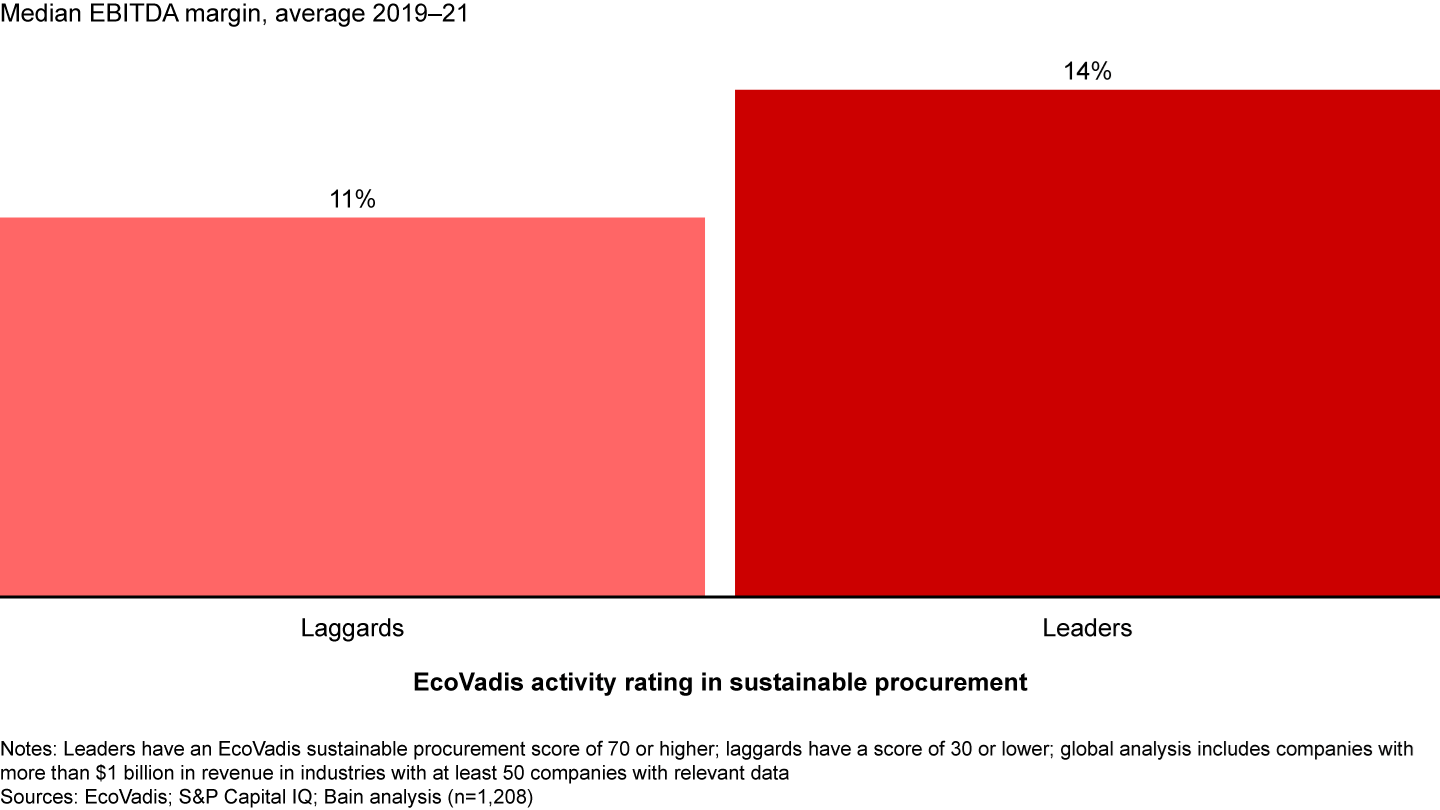Brief

At a Glance
- Beyond benefiting the planet and society, sustainability measures correlate with financial performance, our research shows.
- We found connections between sustainability and business results in the areas of sustainable supply chain, renewable energy, employee satisfaction, and DEI.
- By making three no-regrets moves, companies and private equity funds can realize financial returns while accelerating their ESG transition.
When it comes to environmental, social, and governance (ESG) issues, private equity executives are navigating a crosscurrent of pressures. Some limited partners and stakeholders are pushing to embed various aspects of sustainability into investment decisions and portfolio company management, while other stakeholders question its usefulness. The investment policies of 70% of the limited partners surveyed by Bain & Company and the Institutional Limited Partners Association in 2021 included an ESG approach.
All of this adds urgency to a complex question: Do ESG efforts create value?
In search of an answer, Bain worked with EcoVadis to assess, for the first time, how ESG activities impact the 100,000 companies tracked by EcoVadis, more than 95% of which are private. (Bain has an investment in EcoVadis, a leading supplier of business sustainability ratings.)
Our research examined how various aspects of sustainability and ESG activities—things like setting ESG targets, tracking results, embedding sustainability into management processes, procuring sustainably, and putting in place programs to reduce carbon and improve diversity, equity, and inclusion—correlate with both ESG outcomes and financial performance. Not every analysis yielded a positive correlation, but the research did reveal that, in addition to benefiting the planet and society, ESG activities have no strong negative correlations with financial outcomes; in fact, they are associated with encouraging revenue growth and EBITDA margins. Our findings indicate that positive ESG outcomes are a trait of successful companies and that sustainability measures correlate with better financial performance.
Bain + EcoVadis
Our ESG expertise combined with powerful analytics from EcoVadis to reach your sustainability goals higher faster.
Learn more
Of course, many factors influence a company’s financial results, and it’s not possible to say that these companies’ sustainability efforts led to their strong financial outcomes. And while these early findings are encouraging, the ESG landscape remains nascent. As ESG data becomes richer and more nuanced, we expect to find even stronger evidence of a relationship between ESG activities and financial results.
Companies with strong ESG activities produce strong ESG outcomes (see Figure 1). They improve carbon emissions, use renewable energy, and have more diverse leadership and talent. Working together like the gears of a pocket watch, these activities correlate with improvement in financial and operational results, including higher profitability and revenue growth, customer satisfaction, and employee satisfaction.
Robust ESG activities correlate with strong ESG outcomes and financial results


Strong ESG performance is a sign of a strong business
When we talk about ESG leaders in private equity, we mean, for example, a portfolio company that uses more renewable energy than the average competitor, that has a diverse executive team, and that has been recognized for its high level of ESG maturity by ratings providers.
Among the many areas ESG covers, we found connections between business results and four different aspects of sustainability.
Diversity, equity, and inclusion. Companies highly rated by EcoVadis on the S (social) component of ESG have greater female executive team representation, on average, and companies with the greatest female representation on their executive team have better financial results. Companies that rank in the top 25% of their industry for executive team gender diversity have annual revenue growth approximately 2 percentage points above that of companies in the bottom quartile (see Figure 2). And their EBITDA profit margins are also 3 percentage points higher than that same group. Other studies have attributed this to the fact that having a diverse leadership team provides a broader view of opportunities and risks.
Companies with more women on the executive team have better financial results


Employee satisfaction. ESG leaders have higher employee satisfaction, and companies with the most satisfied employees grow faster and are more profitable. They have three-year revenue growth up to 5 percentage points above those with less-satisfied employees and margins as much as 6 percentage points higher than those laggards (see Figure 3).
ESG activities focused on the workplace help companies do better by their employees. Beyond the basics of fair pay and ensuring a safe work environment, benefits may include career training, mental and physical healthcare, childcare, and educational opportunities, all of which boost employee satisfaction and, as a result, productivity, retention, and the employer’s ability to attract top talent.
Companies with the most satisfied employees grow faster and are more profitable


Renewable energy. In the natural resources, transportation, and industrial goods sectors, companies with high EcoVadis ratings on environmental topics use more renewable energy and have higher EBITDA margins. In the EU, where there is a carbon tax, lowering emissions directly benefits the bottom line; around the world, greater use of renewables also helps hedge against fluctuating fossil fuel prices, and sometimes it’s just cheaper.
Sustainable supply chain. Companies at the forefront of sustainable procurement also have a profitability edge, with margins 3 percentage points above those that don’t focus on their suppliers’ ethics, environmental, and labor practices (see Figure 4).
Sustainable procurement leaders are more profitable


How private companies can catch up
Large public companies have focused on measures such as decarbonization for some time, but many private companies are only now beginning to seriously address them. Our research shows that 53% of large public companies achieve top EcoVadis scores for carbon management, for example, compared with only 35% of large private companies.
Select PE firms have recognized the benefit of early adoption of ESG initiatives, however. One global multistrategy fund recently studied the correlation between the EcoVadis ESG ratings of its portfolio companies and their multiple on invested capital (MOIC) and internal rate of return (IRR). It found that the companies with a higher MOIC and IRR also had higher EcoVadis ratings, illustrating that positive ESG outcomes are a trait of successful companies. And some 93% of limited partners surveyed by Adams Street said that investment returns are enhanced by incorporating ESG factors into their decision making.
By studying the capabilities and actions of ESG leaders, private companies and private equity funds can learn how to effect meaningful change while also realizing financial returns and accelerating their ESG transition.
Private equity investors and companies at all levels of ESG maturity can make these no-regrets moves now:
- First, understand where you are in your ESG journey. Companies and investors can use materiality assessments and benchmarking to identify gaps with ESG leaders in their industries and determine what’s needed to bridge them.
- For companies early in their ESG work, it makes sense to start by building ESG capabilities in-house. This entails a focus on the social aspects of ESG, including training managers on best practices for employee health and safety, selecting a data management tool to build ESG data transparency, and ensuring that basic governance standards on issues like corruption and bribery are in place. This is also the moment when investors and companies can set ESG targets to engage their organizations in their sustainability journeys.
- More advanced companies can engage their supply chain on ESG goals, use ESG to differentiate their product, and focus on the aspects of ESG that are most material in their industry. These will often be environmental issues, such as lowering the carbon footprint, including Scope 3 emissions in that calculation, and developing product circularity.